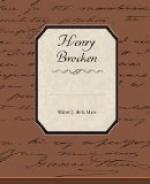After all, thought I as I sipped, effort is the flaw that proves men mortal; while as for hope, who would seek a seed that floats on every wind and smothers the world with weeds that bear no fruit? It was, in fact, fare very different from the ale and cheese of the “World’s End.”
“But you yourself,” I said to Mr. Reverie presently; “in all the talk at the inn you kept a very scrupulous silence—discreet enough, I own. But now, what truly was this Christian of whom we heard so much? and why, may I ask, do his neighbours slander the dead? You yourselves, did you ever meet with him?” I turned from one to the other of my companions as they glanced uneasily each at each.
“Well, sir,” said Reverie rather deliberately, “I have met him and talked with him. I often think of him, in spite of myself. Yet he was a man of little charm. He certainly had a remarkable gift for estranging his friends. He was a foe to the most innocent compromise. For myself, I found not much humour in him, no eye for grace or art, and a limited imagination that was yet his absolute master. Nevertheless, as you hint, these fellows, no more than I, can forget him. Nor you?” He turned to the other.
“Christian,” he replied, “I remember him. We were friends a little while. Faithful I knew also. Faithful was to the last my friend. Ah! Reverie, then—how many years ago!—there was a child we loved, all three: do you remember? I see the low, green wall, cool from how many a summer’s shadows, the clusters of green apples on the bough. And in the early morning we would go, carrying torn-off branches, and shouting our songs through the fields, till we came to the shadow and the hush of the woods. Ay, Reverie, and we would burst in on silence, each his heart beating, and play there. And perhaps it was Hopeful who would steal away from us, and the others play on; or perhaps you into the sunlight that maddened the sheltered bird to flit and sing in the orchard where the little child we loved played—not yet sad, but how much beloved; not yet weary of passing shadows, and simple creatures, and boy’s rough gifts and cold hands. But I—with me it was ever evening, when the blackbird bursts harshly away. Then it was so still in the orchard, and in the curved bough so solitary, that the nightingale, cowering, would almost for fear begin to sing, and stoop to the bending of the bough, her sidelong eyes in shade; while the stars began to stand in the stations above us, ever bright, and all the night was peace. Then would I dream on—dream of the face I loved, Innocence, O Innocence!”




